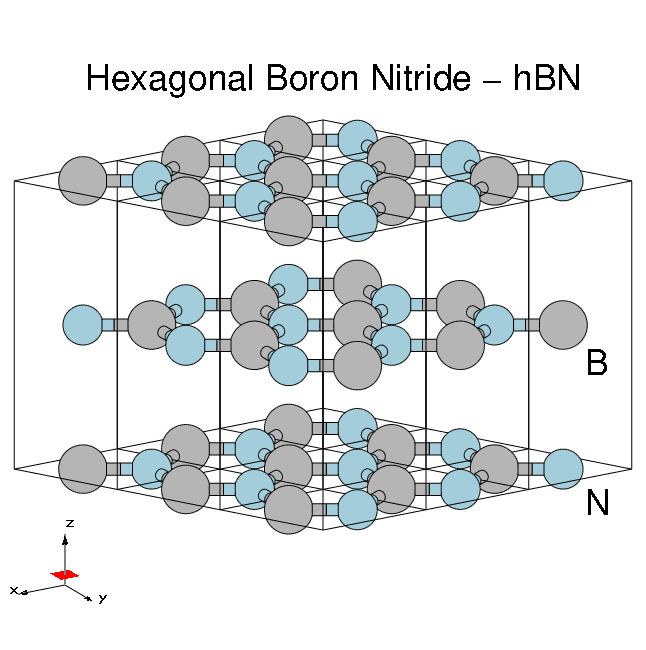Bulk material: h-BN: Difference between revisions
(Hiding DFT part) |
|||
| Line 21: | Line 21: | ||
* Non-SCF run: gamma-centred ''6x6x2'' (14 k-points) grid with 100 bands | * Non-SCF run: gamma-centred ''6x6x2'' (14 k-points) grid with 100 bands | ||
<!-- | |||
== DFT calculations == | == DFT calculations == | ||
$ cd YAMBO_TUTORIALS/hBN/PWSCF | $ cd YAMBO_TUTORIALS/hBN/PWSCF | ||
| Line 48: | Line 50: | ||
data-file.xml charge-density.dat gvectors.dat B.pz-vbc.UPF N.pz-vbc.UPF | data-file.xml charge-density.dat gvectors.dat B.pz-vbc.UPF N.pz-vbc.UPF | ||
K00001 K00002 .... K00035 K00036 | K00001 K00002 .... K00035 K00036 | ||
--> | |||
== Conversion to Yambo format == | == Conversion to Yambo format == | ||
Revision as of 09:08, 1 April 2021
In this module you will learn how to generate the Yambo SAVE folder for bulk hBN starting from a PWscf calculation.
Prerequisites
You will need:
- PWSCF input files and pseudopotentials for hBN bulk
pw.xexecutable, version 5.0 or laterp2yandyamboexecutables- Follow the instructions in the File page and download and unpack the hBN.tar.gz.
System characteristics
Hexagonal boron nitride - hBN:
- HCP lattice, ABAB stacking
- Four atoms per cell, B and N (16 electrons)
- Lattice constants: a = 4.716 [a.u.], c/a = 2.582
- Plane wave cutoff 40 Ry (~1500 RL vectors in wavefunctions)
- SCF run: shifted 6x6x2 grid (12 k-points) with 8 bands
- Non-SCF run: gamma-centred 6x6x2 (14 k-points) grid with 100 bands
Conversion to Yambo format
The PWscf bBN.save output is converted to the Yambo format using the p2y executable (pwscf to yambo), found in the yambo bin directory.
Enter hBN.save and launch p2y:
$ cd hBN.save $ p2y ... <---> DBs path set to . <---> Index file set to data-file.xml <---> Header/K-points/Energies... done ... <---> == DB1 (Gvecs and more) ... <---> ... Database done <---> == DB2 (wavefunctions) ... done == <---> == DB3 (PseudoPotential) ... done == <---> == P2Y completed ==
This output repeats some information about the system and generates a SAVE directory:
$ ls SAVE ns.db1 ns.wf ns.kb_pp_pwscf ns.wf_fragments_1_1 ... ns.kb_pp_pwscf_fragment_1 ...
These files, with an n prefix, indicate that they are in netCDF format, and thus not human readable. However, they are perfectly transferable across different architectures. You can check that the databases contain the information you expect by launching Yambo using the -D option:
$ yambo -D [RD./SAVE//ns.db1]------------------------------------------ Bands : 100 K-points : 14 G-vectors [RL space]: 8029 Components [wavefunctions]: 1016 ... [RD./SAVE//ns.wf]------------------------------------------- Fragmentation :yes ... [RD./SAVE//ns.kb_pp_pwscf]---------------------------------- Fragmentation :yes - S/N 006626 -------------------------- v.04.01.02 r.00000 -
In practice we suggest to move the SAVE folder into a new clean folder.
In this tutorial however, we ask instead that you continue using a SAVE folder that we prepared previously:
$ cd ../../YAMBO $ ls SAVE
Summary
From this tutorial you've learned:
- How to run a DFT calculation with PWscf in preparation for Yambo
- Convert the DFT output into the Yambo format
- How to check the contents of the netCDF databases
| Prev: First steps | Now: Tutorials Home --> First steps --> bulk hBN | Next: Initialization |
